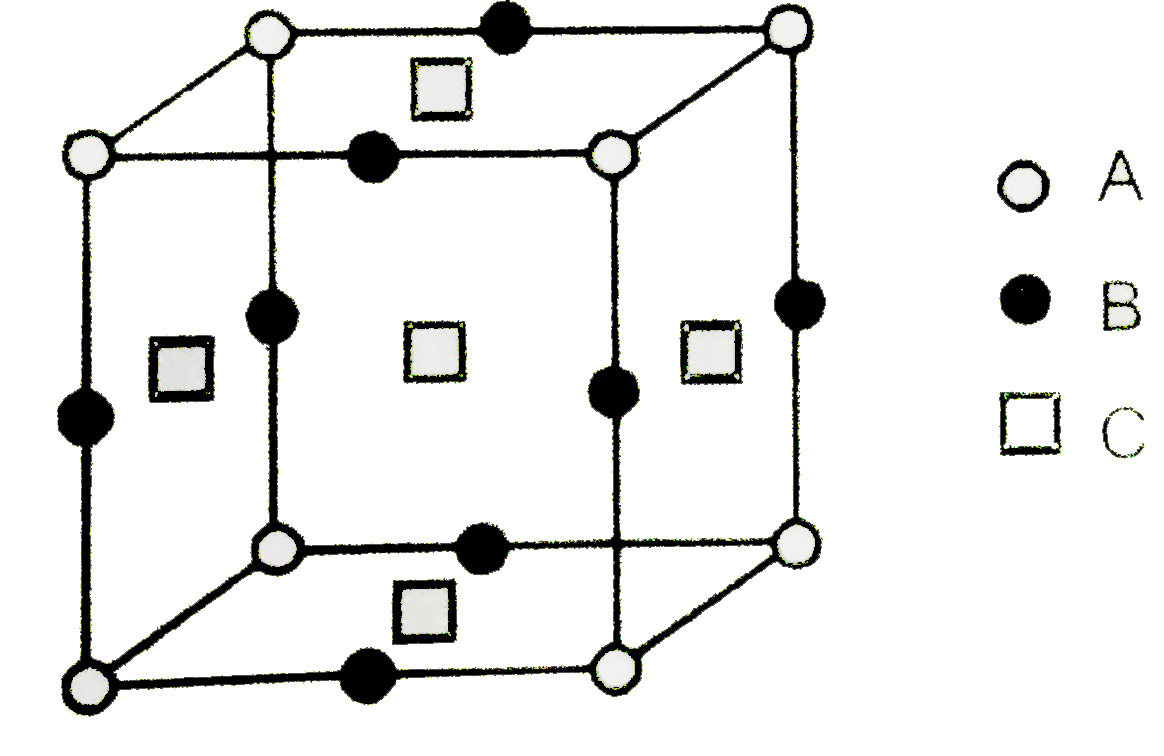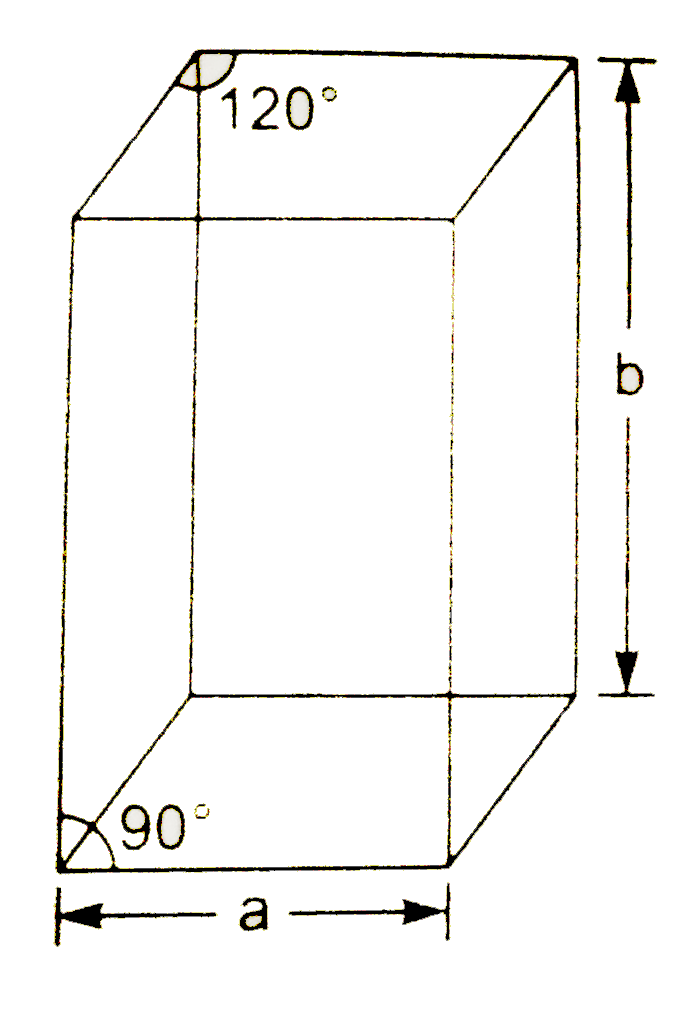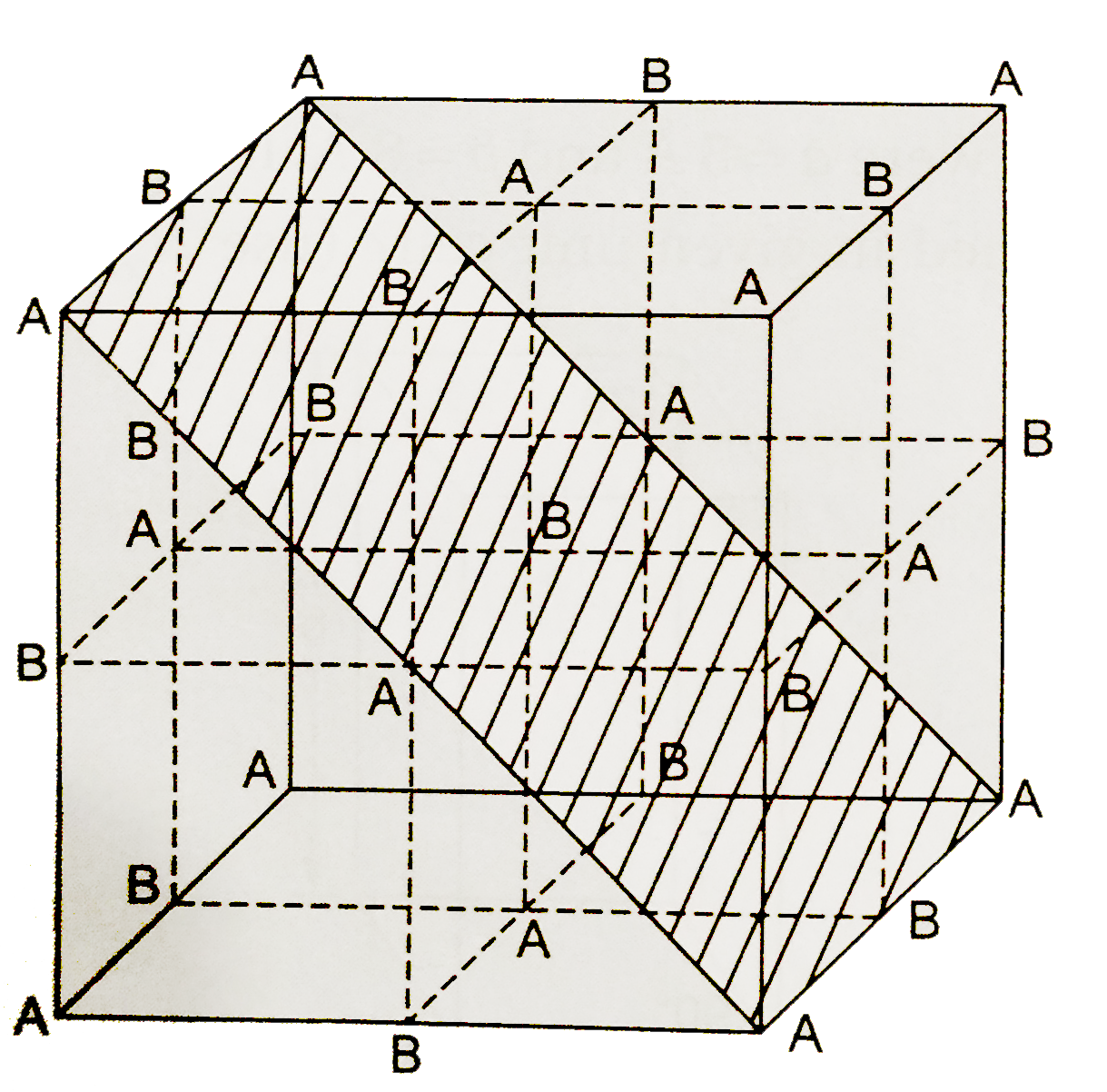Complete Solutions to Level-2 of chapter SOLID STATE of Class 11 book with complete answers and questions
| Class 11 | CHEMISTRY |
| Chapter | SOLID STATE |
| NARENDRA AWASTHI | Level-2 |
| Number Of Questions | 32 |
| Academic Year | 2023-24 |
When heated above `916^(@)C`, iron changes its bcc crystalline from to fcc without the change in the radius of atom . The ratio of density of the crystal before heating and after heating is :
View Solution`TIAI(SO_(4))_(2) .xH_(2)O` is bcc with 'a' =1.22 nm. If the density of the solid is `2.32 g// c c `, then the value of x is (Given :` N_(A) = 6xx 10^(23)`) , at . Mass : `TI=204 , AI =27, S=32`).
View SolutionIn an atomic bcc lattie what fraction of edge is not covered by atoms?
View SolutionThe packing efficiency of a simple cubic crystal with an interstitial atom exactly fitting at the body center is :
View SolutionAn atomic solid crystalliuzen in a body centre cubic lattice and the inner surface of the atoms at the adjacent corner are separated by `60.3 "pm"` .If the atomic mass of A is 48, then density of the solid , is nearly :
View SolutionSodium (Na =23) crystallizen in bcc arrangement with the interfacial separation between the atoms at the edge `53.6 "pm"`. The density of sodium crystal is:
View SolutionThe density of solid Ar (Ar=40 g/mole) is 1.68 g/ml at 40 K. if the argon atom is assumed to be a sphere of radius `1.50xx10^(-8)cm`, then % of solid Ar is apparently empty space?
View SolutionA bcc lattice is made up of hollow spheres of `B`. Spheres of solids `A` are present in hollow spheres of `B`. The radius of `A` is half of the radius of `B`. The ratio of total volume of spheres of `B` unoccupied by `A` in a unit cell and volume of unit cell is `A xx (pisqrt(3))/(64)`. Find the value of `A`.
View SolutionFirst three nearest neighboure distance for primitive cubic lattice are respectively (edge length of unit cell = a):
View SolutionFirst three nearestneighbour distances for body centered cubic lattice are respectively :
View SolutionGiven : The unit cell structure o fcompound is show below .

The formula of compound is :
View SolutionThe density of apure substance 'A' whose atoms are in cubic close pack arragement is `1 g//c c`. If the all the tetrahedral voids are occu[pioed by 'B' atom , What is the density of resulting solid in `g//c c`.[ "Atomic mass" =`(A)= 30 g//"mol"` and atomic mass `(B)= 50 g//"mol"`]
View SolutionIn a planar tetra - atomic molecule, `XY_(3)`,X is at the centroid of the equilateral triangle formed by the atoms , Y. If the X-Y bond distance is `1Å`, what is the distance between the centres of any two Y atoms ?
a. `1//sqrt3 Å`
b. `sqrt2 Å`
c. ` sqrt3 Å`
d. `1//sqrt2 Å`
View SolutionHow many unit cells are present in 5.0 gm of crystal AB (formula mass of AB =40) having rock salt type structure ? (`N_(A)` = Avogadro 's no.)
View SolutionThe density of `CaF_(2)` (flourtie structure ) is `3.18 g// cm^(3)`. The length of the side of the unit cell is :
View SolutionA crystal of lead (II) sulphide has NaCl strcuture . In this crystal the shorest distance between a `Pb^(2+)` ion and `S^(2-)` ion is 297 pm . What is the volume the of unit cell in lead sulphide ?
View Solution`CdO` has `NaCl` like structure with density `8.27g//c c`. If the ionic radius of `O^(2-)` is `1.24A^(@)` determine the ionic radius of `Cd^(2+)`:
View SolutionKCl crystallizes int the same type of lattic as done NaCl . Given that `r_(Na^(+))//r_(Cl^(-)) = 0.50` and `r_(Na^(+))//r_(K^(+)) = 0.70` , Calcualte the ratio of the side of the unit cell for KCl to that for NaCl:
View SolutionFerrous oxide has a cubie structure and edge length of the uint cell is ` 5.0Å` . Assuming the density o ferrous oxide to be `3.84 g//cm^(3)` , the no. Of `Fe^(2+)` and `O^(2-)` ions present in each unit cell be : (use `N_(A)= 6xx 10^(23)`):
View SolutionIf an element (at. Mass =50) crystallise in fc lattie ,with a= 0.50 nm . What is the denstiy of unit cell if it conatins `0.25%` Schottuy defects (use `N_(A) = 6xx 10^(23)`)?
View SolutionAn element X (At. Wt. =24) forms FCC lattice. If the edge length of lattice is `4 xx 10^(-8)` cm and the observed density is `2.4 xx 10^(3 kg//m^(3)`. Then the percentage occupancy of lattice point by element X is : `(N_(A) = 6 x 10^(23))`
View SolutionIn fcc lattice ,A, B, C,D atoms are arranged at corner , face centre , ocatahedral void and tetrahedral void respectively , then the body diagonal contains :
View SolutionThe distance between an ocatahral and tetrahedral void in fcc lattice would be:
View Solution`A_(2)B` molecules`(" molar mass " = 259.8 g//"ml")` crystallises in a hexagonal lattice as shown in figure .The lattic constants were `a=5 Å` and `b=8 Å` . If denstiy of crystal is `5 g//cm^(3)` then how many molecules are contained in given unit cell ? `(" Use" N_(A) = 6xx10^(23))`

(a)6
(b)4
(c)3
(d)2
View SolutionGraphite has h.c.p arrangements of carbon atoms and the parallel planes are `3.35 Å` apart . Determine density of graphite :
View SolutionHow many effiective `Na^(+)` and `Cl^(-)` ions are present respectively in a uint cell of NaCl solid (Rock salt structure ) if all ions along line connecting opposite face centres are absent ?
View SolutionA crystal is made of particles X and Y.X form fcc packing and Y occupies all the octahedral voids . If all the particles along one body diagonal are removed then the formula of the crystal would de :
View SolutionSelect right expression for determinig packing fraction (P.F.) of NaCl unit cell (assume ideal ) , if ions along an edge diagonal are absent :
View SolutionA crystal is made of particles X,Y and Z.X form fcc packing . Y occupies all the octahedral void of X and Z occupies all the tetrahedral voids of X . If all the particles along one body diagonal are removed then the formula of the crystal would be:
View SolutionA crystal is made of particles A and B . From fcc packing and B occupies all the octahedral voids . If all the particle along the plane as shown in figure are removed , then, the formula of the crystal would be :

View SolutionIn the rock salt AB, if C introduced in tetrahedral voids such that no distoration occurss, then fromula of resultant compound is :
View SolutionGiven length of side of hexagonal unit cell is `(100)/sqrt(2)` pm . The volume of hexagonal unit cell is `("in" "pm"^(3))`:
View Solution
Level-2 questions and complete solutions for chapter SOLID STATE of NARENDER AVASTHI CHEMISTRY (ENGLISH) of Class 11